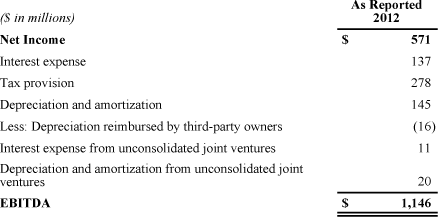Financial Information
Earnings Before Interest Expense, Taxes, Depreciation and Amortization (“EBITDA”) and Adjusted EBITDA
EBITDA, a financial measure that is not prescribed or authorized by United States generally accepted accounting principles (“GAAP”), reflects earnings excluding the impact of interest expense, provision for income taxes, depreciation and amortization. We believe that EBITDA is a meaningful indicator of operating performance because we use it to measure our ability to service debt, fund capital expenditures, and expand our business. We also use EBITDA, as do analysts, lenders, investors and others, to evaluate companies because it excludes certain items that can vary widely across different industries or among companies within the same industry. For example, interest expense can be dependent on a company’s capital structure, debt levels, and credit ratings. Accordingly, the impact of interest expense on earnings can vary significantly among companies. The tax positions of companies can also vary because of their differing abilities to take advantage of tax benefits and because of the tax policies of the jurisdictions in which they operate. As a result, effective tax rates and provision for income taxes can vary considerably among companies. EBITDA also excludes depreciation and amortization because companies utilize productive assets of different ages and use different methods of both acquiring and depreciating productive assets. These differences can result in considerable variability in the relative costs of productive assets and the depreciation and amortization expense among companies.
We also believe that Adjusted EBITDA, another non-GAAP financial measure, is a meaningful indicator of operating performance. Our Adjusted EBITDA reflects:
- Timeshare Spin-off Adjustments for 2011 (“Timeshare Spin-off Adjustments”) as if the spin-off occurred on the first day of 2011. The Timeshare Spin-off Adjustments of $260 million reflected in net income for 2011 totaled $300 million pre-tax and are primarily comprised of the following pre-tax items: (1) the addition of $217 million to remove the losses of our former Timeshare segment; (2) the addition of a $60 million payment by MVW to us of estimated license fees; (3) the addition of $34 million to remove unallocated spin-off transaction costs; (4) the addition of $10 million of estimated interest income; (5) the subtraction of $14 million of estimated interest expense; and (6) the subtraction of $7 million of other expenses not previously allocated to our former Timeshare segment; and
- Adjustments for Other Charges for 2011. These adjustments of $17 million to net income for 2011 totaled $28 million pre-tax and consist of the following pre-tax items: (1) an $18 million charge for an other-than-temporary impairment of marketable securities; and (2) a $5 million impairment of deferred contract acquisition costs and a $5 million accounts receivable reserve, both for one Luxury segment property whose owner filed for bankruptcy. We discuss the other-than-temporary impairment of marketable securities in greater detail in the preceding “Gains (Losses) and Other Income” caption.
We believe that Adjusted EBITDA that excludes these items is also a meaningful measure of our operating performance because it permits period-over-period comparisons of our ongoing core operations before material charges. EBITDA and Adjusted EBITDA also facilitate our comparison of results from our ongoing operations before material charges with results from other lodging companies.
EBITDA and Adjusted EBITDA have limitations and should not be considered in isolation or as substitutes for performance measures calculated under GAAP. Both of these non-GAAP measures exclude certain cash expenses that we are obligated to make. In addition, other companies in our industry may calculate EBITDA and in particular Adjusted EBITDA differently than we do or may not calculate them at all, limiting EBITDA’s and Adjusted EBITDA’s usefulness as comparative measures. We provide Adjusted EBITDA for illustrative and informational purposes only and Adjusted EBITDA is not necessarily indicative of, and we do not purport that it represents, what our operating results would have been had the spin-off occurred on the first day of 2011. Adjusted EBITDA also does not reflect certain financial and operating benefits we expect to realize as a result of the 2011 timeshare spin-off.
We show our 2012 and 2011 EBITDA and Adjusted EBITDA calculations and reconcile those measures with Net Income in the following tables:


